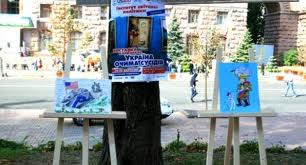The Institute of World Policy is the first Ukrainian think tank to implement a comprehensive project examining the soft power of a regional rather than a global power, Ukraine.The aim of the project “Ukraine’s Soft Power in the Region: The tool for effective foreign policy” is to make Ukraine popular and “trendy” for the neighboring states, so that Ukraine could use its attractiveness for the benefit of its own national interests. Promo video of the project.
Using a specially developed methodology that Harvard University Professor Joseph Nye, the coiner of the term “soft power”, himself approved of, the Institute of World Policy has measured Ukraine’s soft power potential in six countries of the region: Belarus, Georgia, the Republic of Moldova, Poland, Romania and Russia. The research consisted of five components: desk research according to above 30 qualitative and quantitative indicators (e.g. the attractiveness of Ukraine’s political course, influence of the Ukrainian community, Ukrainian embassy’s performance, popularity of Ukrainian culture in the researched country, etc.), media monitoring in the researched countries, expert survey including more than 100 experts from the neighboring countries, and video conferences with Joseph Nye (transcript) and Adam Michnik, the editor-in-chief of “Gazeta Wyborcza” (Poland).
{5}
The Institute of World Policy has calculated the index of Ukraine’s “soft power” in the region, based on a ten-point scale and an arithmetical mean of aggregated ratings that the surveyed experts provided. So far, Ukraine’s soft power is the strongest in Moldova (6.3 points) and the weakest in Romania (2.88 points). Ukraine’s soft power index is 5.33 points in Georgia, 4.59 in Belarus and 4 points in Poland. The Institute of World Policy has presented a series of practical recommendations for the Ukrainian government aimed at strengthening Ukraine’s soft power in all countries in the region.
Please click here to download the publication “Ukraine’s Soft Power in the region: The Tool for Effective Foreign Policy” in English.
Also the Institute of World Policy commissioned 50 cartoons on the topic “Ukraine as Seen by Neighbouring Countries” from 16 foreign and 5 Ukrainian artists.
{8}
{9}
The results of the project “Ukraine’s Soft Power in the region: The Tool for Effective Foreign Policy” were presented to the representatives of the state institutions, politicians, diplomats, businessmen, artists, writers, civil society leaders and journalists on September 23, 2011. Photos.
{1}
{2}
In order to promote the results of the project as much as possible, the Institute of World Policy held “Street University” on September, 24-25 in the heart of Kyiv. All interested public was welcome to attend the exhibition of cartoons which took place on Khreschatyk str., in front of Kyiv City State Administration. The exposition was accompanied by the explanations from IWP experts.
{3}
{4}
Then on October 15 the cartoon exhibition “Ukraine as Seen by Neighbouring Countries” was presented in the heart of the US capital – on Dupont Circle in Washington DC.
{11}
{12}
And in December 2011, the Ukrainian MPs got a chance to see that exhibition as it was presented in the Parliament of Ukraine.
{6}
{7}
In an attempt to find out what the thought of Ukraine really evokes among the intellectual elites of the international community, and as part of the project “Ukraine’s Soft Power: A Tool for effective foreign policy”, the Institute of World Policy surveyed experts, journalists, politicians and statesmen in the six countries that know Ukraine best: its neighbors.
Based on the answers of nearly 100 prominent opinion-makers in these countries (Belarus, Georgia, the Republic of Moldova, Poland, Romania and the Russian Federation), IWP has identified the 5 notions (“Top 5”) most associated with Ukraine in each country. The full text of the publication “”Ukraine’s Soft Power: TOP 30 Notions Associated with Ukraine in the Region”” is here.
The research was conducted by the Institute of World Policy as part of its project implemented under Ukraine National Initiatives to Enhance Reforms (UNITER) program which is funded by the United States Agency for International Development (USAID) and implemented by Pact Inc.




Comments theme
Comments themeComments themeComments themeComments themeComments themeComments themeComments themeComments themeComments themeComments themeComments themeComments themeComments themeComments themeComments themeComments themeComments themeComments themeComments themeComments.